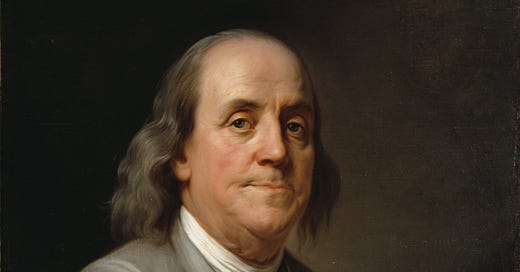Free post!
Good morning to you and happy Independence Day - although the real Independence Day was two days ago but that’s a losing battle. I hope you enjoy the post.
A Republic if You can keep It
A Republic if You can keep It
Once the Constitutional Convention adjourned in September of 1787, the venerable Benjamin Franklin – a delegate to the Convention – was greeted by a crowd outside the Pennsylvania State House and among the crowd was Philadelphia socialite Elizabeth Willing Powell. It was she who posed a question to Dr. Franklin that Americans came to not only know but also his response. The story goes Mrs. Powell asked Dr. Franklin, “Well, Doctor, what have we got: a republic or a monarchy?” Franklin answered, “A republic, if you can keep it.”
The answer to this question appears simple in nature but keeping the republic is – by far – a high degree of difficulty. To put this into context, the Convention was called in the wake of Shays’ Rebellion. What Daniel Shays’ resistance displayed over the course of six months was the Articles of Confederation – the governing system at the time that assured states’ rights over a central authority – could not adequately provide for the general welfare or protect the citizenry from armed attack. Why? Well under the Articles of Confederation, the Congress – the only central governing body at the time – could not raise an army. It had to rely on states to send their militias. Furthermore, Congress could levy taxes but could not collect them. It would rely on the states to send their revenue to it. It should also be known there was no unified currency as there is today. This means that every state had its own currency as did the Congress, which led to rapid heights of inflation and complete economic instability. To put this another way, the Articles were severely weak and reformation was necessary.
The product of the Convention was nothing short of compromise, some brilliant and others problematic. Despite that, the Framers kept state power alive while creating a stronger central authority. Within it, three co-equal branches were created to check and balance the other. Furthermore, this new central authority could check and balance state power and states could check and balance the central authority’s power.
While this seems ideal in the abstract, practicing it is difficult. Attempting to answer questions of states overreaching their power and/or the federal government overreaching its authority are essentially case by case issues. Then it must be wondered who resolves such dilemmas? For such, Americans have looked to the federal courts. For better, for worse, those rulings help shape the country we now know.
When it comes to governmental power and the concept of checks and balances, one must acknowledge it has changed in the last five years. Since the return of Donald Trump to the White House, Congress morphed from a watch dog, into his lapdog; and the Supreme Court no longer interprets the Constitution through any factual or legal basis rather than the Justices’ political ideology.
Case in point is the recent Supreme Court decision Trump v CASA (2025) that concerned nationwide injunctions over birthright citizenship. In this case, the interpretation of birthright citizenship – that is clearly read in the 14th Amendment to the Constitution – was not considered. However, nationwide injunctions – the power of a Court to stop action taking effect – were. In this case, the Court ruled only states that sued are party to the injunction. While the president and his allies celebrated this ruling as a victory for now, it may not be great for the country in the future. Take for instance the issue of gun safety versus gun rights. If Congress passed a bill limiting the age of those who could purchase a semi-automatic rifle and the president signed it into law and states that are ran by Republicans sue this and an injunction is levied, this injunction would only affect the suing states. Same goes for states ran by Democrats suing over health care or whatever the issue is ran by whatever state ran by any Party. The CASA case will have a rippling effect on the judiciary and its influence going forward, not to mention its role in the system of checks and balances.
Americans should shutter at this decision because we are a country of laws in perpetual union, not an alliance of friendship in perpetual confusion. Whether we like Supreme Court decisions or not is our prerogative, but when the Court changes the fabric of our institutions to strengthen one branch and weaken another, we all should be alarmed. Framer James Madison wrote in Federalist 51 that “ambition must be made to counteract ambition,” meaning checks and balances are necessary to our governing system. The landmark case of CASA made governing no longer about ambition counteracting ambition. Ambition of one chamber is now met with submission from another.
While we should be very concerned about the future of our governing institutions, I am reminded of what Dr. Franklin told Mrs. Powell in September of 1787 and continue to foster hope for our future. Because the cornerstone of the United States is the will of the governed, or the people. Under a republic, the people’s consent reigns supreme, not a monarch. In order to sustain and reform the system, it is our civic obligation to be informed and involved. After all, we have a republic to keep.
Media of the Day
That is all from me, friends. I hope you have a great weekend and will see you again soon.
-DL
Have a thought about today’s content? Hit that reply to tell me or click on the comment button below to start a conversation.







